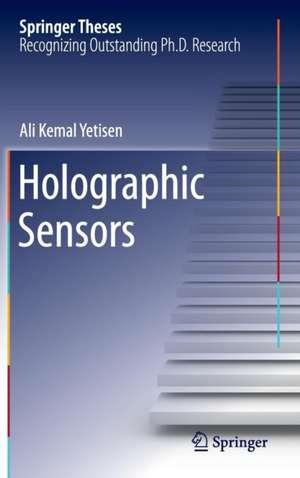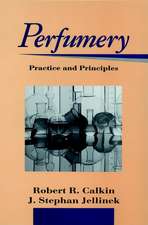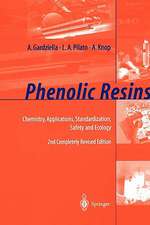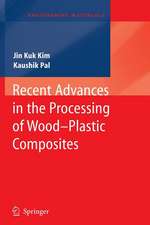Holographic Sensors: Springer Theses
Autor Ali Kemal Yetisenen Limba Engleză Hardback – 18 dec 2014
Developing non-invasive and reusable diagnostics sensors that can be easily manufactured will support the monitoring of high-risk individuals in any clinical or point-of-care setting. Sensor fabrication approaches outlined include silver-halide chemistry, laser ablation and photopolymerization. The sensors employ off-axis Bragg diffraction gratings of ordered silver nanoparticles and localized refractive index changes in poly (2-hydroxyethyl methacrylate) and polyacrylamide films. The sensors exhibited reversible Bragg peak shifts, and diffracted the spectrum of narrow-band light over the wavelength range λpeak ≈ 495-1100 nm. Clinical trials of glucose sensors in the urine samples of diabetic patients demonstrated that they offer superior performance compared to commercial high-throughput urinalysis devices. Lastly, a generic smartphone application to quantify colorimetric tests was developed and tested for both Android and iOS operating systems. The sensing platform and smartphone application may have implications for the development of low-cost, reusable and equipment-free point-of-care diagnostic devices.
| Toate formatele și edițiile | Preț | Express |
|---|---|---|
| Paperback (1) | 634.82 lei 6-8 săpt. | |
| Springer International Publishing – 10 sep 2016 | 634.82 lei 6-8 săpt. | |
| Hardback (1) | 640.88 lei 6-8 săpt. | |
| Springer International Publishing – 18 dec 2014 | 640.88 lei 6-8 săpt. |
Din seria Springer Theses
- 18%
 Preț: 997.88 lei
Preț: 997.88 lei -
 Preț: 389.88 lei
Preț: 389.88 lei - 15%
 Preț: 646.94 lei
Preț: 646.94 lei - 18%
 Preț: 943.43 lei
Preț: 943.43 lei -
 Preț: 399.29 lei
Preț: 399.29 lei - 18%
 Preț: 944.99 lei
Preț: 944.99 lei - 15%
 Preț: 636.80 lei
Preț: 636.80 lei - 18%
 Preț: 941.05 lei
Preț: 941.05 lei - 15%
 Preț: 643.16 lei
Preț: 643.16 lei - 15%
 Preț: 642.68 lei
Preț: 642.68 lei - 18%
 Preț: 1103.62 lei
Preț: 1103.62 lei - 20%
 Preț: 558.83 lei
Preț: 558.83 lei - 18%
 Preț: 1112.30 lei
Preț: 1112.30 lei - 18%
 Preț: 944.19 lei
Preț: 944.19 lei - 18%
 Preț: 1109.92 lei
Preț: 1109.92 lei - 18%
 Preț: 1217.27 lei
Preț: 1217.27 lei - 15%
 Preț: 640.06 lei
Preț: 640.06 lei - 15%
 Preț: 636.45 lei
Preț: 636.45 lei - 15%
 Preț: 640.06 lei
Preț: 640.06 lei - 15%
 Preț: 640.88 lei
Preț: 640.88 lei -
 Preț: 389.70 lei
Preț: 389.70 lei - 20%
 Preț: 563.91 lei
Preț: 563.91 lei -
 Preț: 393.35 lei
Preț: 393.35 lei - 15%
 Preț: 637.93 lei
Preț: 637.93 lei - 15%
 Preț: 641.85 lei
Preț: 641.85 lei - 18%
 Preț: 1225.94 lei
Preț: 1225.94 lei - 20%
 Preț: 551.36 lei
Preț: 551.36 lei - 18%
 Preț: 1229.10 lei
Preț: 1229.10 lei - 15%
 Preț: 639.25 lei
Preț: 639.25 lei - 18%
 Preț: 999.45 lei
Preț: 999.45 lei - 15%
 Preț: 640.06 lei
Preț: 640.06 lei - 18%
 Preț: 1220.45 lei
Preț: 1220.45 lei - 18%
 Preț: 1116.26 lei
Preț: 1116.26 lei - 18%
 Preț: 1110.72 lei
Preț: 1110.72 lei - 18%
 Preț: 1000.87 lei
Preț: 1000.87 lei - 18%
 Preț: 891.17 lei
Preț: 891.17 lei - 15%
 Preț: 640.06 lei
Preț: 640.06 lei - 5%
 Preț: 1154.07 lei
Preț: 1154.07 lei - 15%
 Preț: 635.96 lei
Preț: 635.96 lei - 15%
 Preț: 640.88 lei
Preț: 640.88 lei -
 Preț: 387.20 lei
Preț: 387.20 lei - 18%
 Preț: 1109.92 lei
Preț: 1109.92 lei -
 Preț: 385.25 lei
Preț: 385.25 lei -
 Preț: 385.25 lei
Preț: 385.25 lei - 18%
 Preț: 1112.30 lei
Preț: 1112.30 lei - 18%
 Preț: 999.45 lei
Preț: 999.45 lei -
 Preț: 386.99 lei
Preț: 386.99 lei - 15%
 Preț: 637.13 lei
Preț: 637.13 lei - 20%
 Preț: 554.21 lei
Preț: 554.21 lei - 20%
 Preț: 555.59 lei
Preț: 555.59 lei
Preț: 640.88 lei
Preț vechi: 753.97 lei
-15% Nou
Puncte Express: 961
Preț estimativ în valută:
122.65€ • 127.57$ • 101.25£
122.65€ • 127.57$ • 101.25£
Carte tipărită la comandă
Livrare economică 15-29 aprilie
Preluare comenzi: 021 569.72.76
Specificații
ISBN-13: 9783319135830
ISBN-10: 331913583X
Pagini: 208
Ilustrații: XVIII, 162 p. 72 illus., 55 illus. in color.
Dimensiuni: 155 x 235 x 17 mm
Greutate: 0.43 kg
Ediția:2015
Editura: Springer International Publishing
Colecția Springer
Seria Springer Theses
Locul publicării:Cham, Switzerland
ISBN-10: 331913583X
Pagini: 208
Ilustrații: XVIII, 162 p. 72 illus., 55 illus. in color.
Dimensiuni: 155 x 235 x 17 mm
Greutate: 0.43 kg
Ediția:2015
Editura: Springer International Publishing
Colecția Springer
Seria Springer Theses
Locul publicării:Cham, Switzerland
Public țintă
ResearchCuprins
Introduction.- Materials and Methods.- pH-Responsive Holograms.- Divalent Metal Cation Selective Holographic Sensors.- Glucose-Responsive Holograms and Clinical Trials on Diabetic Patients.- A Smartphone Algorithm for the Quantification of Colorimetric Assays.- Final Discussion.
Notă biografică
Ali Yetisen received his B.Sc. degree in Mechanical Engineering from the University of Arizona in 2010, and his Ph.D. in Biotechnology from the University of Cambridge in 2014. His research interests are nanotechnology, nanoparticles, diagnostics, biomaterials and drug delivery. He has taught entrepreneurship and commercialization courses at the Judge Business School in Cambridge. Ali has published 25 journal articles and has a patent licenced to Hoffmann-La Roche. He has been the recipient of The Ann & Norman Hilberry Scholarship, Roche Continents Award, and Cambridge Infectious Diseases Fellowship. Currently, Ali serves as a reviewer for 20 journals in nanotechnology.
Textul de pe ultima copertă
This thesis presents a theoretical and experimental approach for the rapid fabrication, optimization and testing of holographic sensors for the quantification of pH, organic solvents, metal cations, and glucose in solutions.
Developing non-invasive and reusable diagnostics sensors that can be easily manufactured will support the monitoring of high-risk individuals in any clinical or point-of-care setting. Sensor fabrication approaches outlined include silver-halide chemistry, laser ablation and photopolymerization. The sensors employ off-axis Bragg diffraction gratings of ordered silver nanoparticles and localized refractive index changes in poly (2-hydroxyethyl methacrylate) and polyacrylamide films. The sensors exhibited reversible Bragg peak shifts, and diffracted the spectrum of narrow-band light over the wavelength range λpeak ≈ 495-1100 nm. Clinical trials of glucose sensors in the urine samples of diabetic patients demonstrated that they offer superior performance compared to commercial high-throughput urinalysis devices. Lastly, a generic smartphone application to quantify colorimetric tests was developed and tested for both Android and iOS operating systems. The sensing platform and smartphone application may have implications for the development of low-cost, reusable and equipment-free point-of-care diagnostic devices.
Developing non-invasive and reusable diagnostics sensors that can be easily manufactured will support the monitoring of high-risk individuals in any clinical or point-of-care setting. Sensor fabrication approaches outlined include silver-halide chemistry, laser ablation and photopolymerization. The sensors employ off-axis Bragg diffraction gratings of ordered silver nanoparticles and localized refractive index changes in poly (2-hydroxyethyl methacrylate) and polyacrylamide films. The sensors exhibited reversible Bragg peak shifts, and diffracted the spectrum of narrow-band light over the wavelength range λpeak ≈ 495-1100 nm. Clinical trials of glucose sensors in the urine samples of diabetic patients demonstrated that they offer superior performance compared to commercial high-throughput urinalysis devices. Lastly, a generic smartphone application to quantify colorimetric tests was developed and tested for both Android and iOS operating systems. The sensing platform and smartphone application may have implications for the development of low-cost, reusable and equipment-free point-of-care diagnostic devices.
Caracteristici
Nominated as an outstanding Ph.D. thesis by the University of Cambridge, UK Offers a concise overview of holographic sensors and their fundamentals Presents comprehensive computational methods and experimental techniques Provides tutorials for fabricating holographic pH, organic solvent, metal ion, and glucose sensors Includes supplementary material: sn.pub/extras















